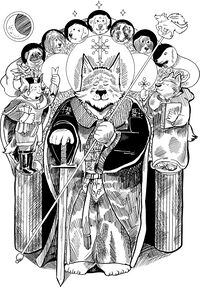Emperor: Difference between revisions
(Created page with "{{Infobox monarchy | royal_title = Emperor | realm = the Dogs | native_name = Kutyák Uralkodó | border = Imperial | coatofarms...") |
(Added content) |
||
| (One intermediate revision by the same user not shown) | |||
| Line 23: | Line 23: | ||
}} | }} | ||
The '''Emperor''', officially the '''Emperor of the Dogs''' ({{wpl|Hungarian Language|Imperial Standard}}: ''Kutyák Uralkodó'') is both the {{wpl|head of state}} and the {{wpl|head of government}} of [[The Empire (Noble Dog)|The Empire]]. It is very frequent occurance to refer the title of the monarch as simply the Emperor (''Uralkodó''). The first official Emperor was [[Álmo I]] of the [[ | The '''Emperor''', officially the '''Emperor of the Dogs''' ({{wpl|Hungarian Language|Imperial Standard}}: ''Kutyák Uralkodó'') is both the {{wpl|head of state}} and the {{wpl|head of government}} of [[The Empire (Noble Dog)|The Empire]]. It is very frequent occurance to refer the title of the monarch as simply the Emperor (''Uralkodó''). The first official Emperor was [[Álmo I]] of the [[Salgó people|Salgó]] [[House of Barabás]]. The current [[Balaton people|Balaton Veszprémic]] [[House of Esterházy]] came into power after being elected in by the [[Imperial Diet]] in 1700. The current monarch is ''{{wpl|de-jure}}'' [[János IX]], but is disputed by his siblings [[Miklós Esterházy, Alispán of Zamárdi]] and [[Katalin Esterházy, Alispán of Látrány]]. | ||
The [[Articles of Unification]] and subsequent [[Constitution of the Empire]] establishes the office of the Emperor as a semi-constitutional monarchy as apart of the government. The Emperor is established by electing on of the seven families represented within the Imperial Diet. This was signed by the [[Unification Assembly|Third Unification Assembly]] and establishes the following noble houses as permenant members of the Imperial Diet: [[Kossuth people|Jenő Kossuth]] [[House of Vásárosnamény]], [[Hegyhát people|Hódítók Hegyhát]] [[House of Hegedűs]], [[Hévíz people|Rédics Hévíz]] [[House of Hunyadi]], [[Balaton people|Veszprémic Balaton]] [[House of Esterházy]], [[Csongrád people|Sió Csongrád]] [[House of Prohászka]], [[Esztergom people|Erdős Esztergom]] [[House of Velencei]], and the [[Salgó people|Salgó]] [[House of Barabás]]. Each of the houses elects another noble house to have {{wpl|sovereignity}} for a century. Typically, the Imperial Diet will elect another family within the Diet. The last time a noble house outside of the Diet was elected to have sovereignity was the [[Kassa people|Salgó Kassa]] [[House of Szobránc]]. | |||
The Emperor's powers are complicated and are detailed primarily in the Constitution of the Empire. The Emperor carries official government and ceremonial duties and is considered to be the official head of the Imperial Diet and the ceremonial head of the [[Noble Assembly]] (''Nemesigyűlés''). The Emperor is able to issue [[Imperial Edicts]] that can be contested by the Imperial Diet if they are found to be contrary to the state of the Empire. | |||
Latest revision as of 04:20, 22 October 2022
| Emperor of the Dogs | |
|---|---|
| Kutyák Uralkodó | |
 | |
| Incumbent | |
| János IX (Disputed) since 7th Asm. 1742 | |
| Details | |
| Style | His Serene Highness |
| First monarch | Álmo I |
| Formation | 0000 |
| Appointer | Officially the Imperial Diet Ceremonially the Dózse |
| Pretender(s) | Miklós Esterházy, Alispán of Zamárdi Katalin Esterházy, Alispán of Látrány |
The Emperor, officially the Emperor of the Dogs (Imperial Standard: Kutyák Uralkodó) is both the head of state and the head of government of The Empire. It is very frequent occurance to refer the title of the monarch as simply the Emperor (Uralkodó). The first official Emperor was Álmo I of the Salgó House of Barabás. The current Balaton Veszprémic House of Esterházy came into power after being elected in by the Imperial Diet in 1700. The current monarch is de-jure János IX, but is disputed by his siblings Miklós Esterházy, Alispán of Zamárdi and Katalin Esterházy, Alispán of Látrány.
The Articles of Unification and subsequent Constitution of the Empire establishes the office of the Emperor as a semi-constitutional monarchy as apart of the government. The Emperor is established by electing on of the seven families represented within the Imperial Diet. This was signed by the Third Unification Assembly and establishes the following noble houses as permenant members of the Imperial Diet: Jenő Kossuth House of Vásárosnamény, Hódítók Hegyhát House of Hegedűs, Rédics Hévíz House of Hunyadi, Veszprémic Balaton House of Esterházy, Sió Csongrád House of Prohászka, Erdős Esztergom House of Velencei, and the Salgó House of Barabás. Each of the houses elects another noble house to have sovereignity for a century. Typically, the Imperial Diet will elect another family within the Diet. The last time a noble house outside of the Diet was elected to have sovereignity was the Salgó Kassa House of Szobránc.
The Emperor's powers are complicated and are detailed primarily in the Constitution of the Empire. The Emperor carries official government and ceremonial duties and is considered to be the official head of the Imperial Diet and the ceremonial head of the Noble Assembly (Nemesigyűlés). The Emperor is able to issue Imperial Edicts that can be contested by the Imperial Diet if they are found to be contrary to the state of the Empire.